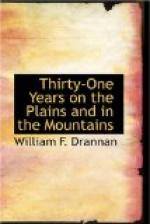Black Buffalo, and indeed all the Kiowa tribe, were well acquainted with Uncle Kit and had great respect for him. So a general hand-shaking and pow-wow followed.
Carson spoke their language as well as they could, and consequently had no difficulty conversing with them.
In those days very few Indians knew a word of English, consequently all conversation with them had to be carried on in the several tribal languages or dialects, or in the jargon.
This latter was a short language composed of Indian, French and English words, and was called “Chinook.” It originated with the fur traders of Astoria, Ore., and its growth was assisted by missionaries, until it became the means of communication between the whites and the Indians of the coast and interior of the vast Northwest, and even between Indians whose dialects were unknown to each other. In short it was a sort of Indian “Volapuk,” and was very easily mastered. There has been a dictionary of it printed, and I have known a bright man to acquire the vocabulary in two or three days.
Black Buffalo and his little band shortly turned about and rode back to their village, which was only two miles away. But they first invited us to visit them, which we did, as not to have done so would have been a violent breach of plains etiquette, that might cause a disruption of friendship.
In the Indian village, after our horses had been unpacked and turned out to graze, Uncle Kit and Black Buffalo strolled about among the lodges or wick-i-ups, of which there were something like fifteen hundred. I followed very closely for I was mortally afraid to get fifteen feet away from Uncle Kit, in that sort of company.
Black Buffalo did us the honor, that evening, to take us to his own private wick-i-up for supper. It was a custom with this, and many other tribes of Indians, that conveyed great distinction to visitors, to kill and cook for them a nice fat dog. However, I was not then aware that I was so distinguished a guest, as indeed neither I nor Mr. Hughes would have been had we not been in the company of Kit Carson. With him we shone by reflected greatness.
While we were out on our walk about the village, Black Buffalo’s cook was preparing this distinguishing feast for us.
I had kept unusually quiet all the time we were among the Indians, not even asking one question, which was very remarkable in me. For I presume that on the journey I had asked more questions to the lineal mile than any boy ever had before.
But I ate the dog in silence and liked it. Of course I had no idea what the meat was. So, Uncle Kit observing the gusto with which I was devouring dog, asked me if I knew what the meat was. I told him that I did not, but supposed it to be antelope, or buffalo. He informed me that it was neither, but good, healthy dog.
I thought he was joking, and simply replied that it was mighty good meat, even if it was dog, and gave the matter no further reflection, at the time.




